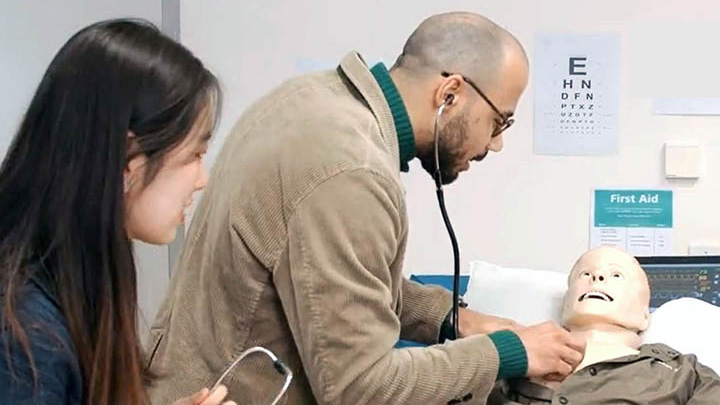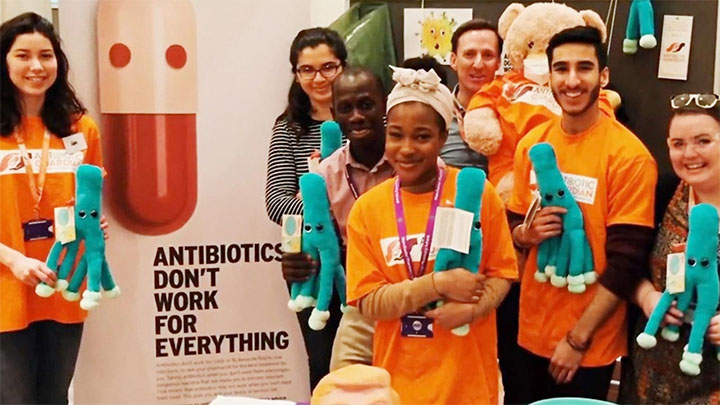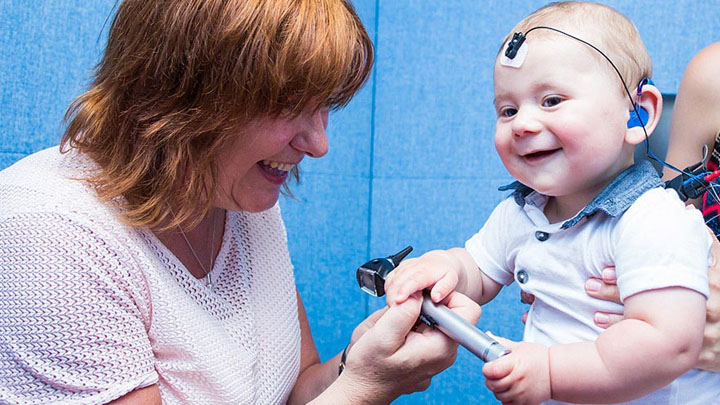
Improving lives through excellence in teaching and research.
The School of Health Sciences integrates research and education across diverse fields such as audiology, psychology, population health, health economics, epidemiology, nursing, pharmacy and data sciences.
Our unique strength lies in our commitment to social responsibility and impactful research, contributing to pioneering solutions for health and societal challenges. We have strong links with the University's research platforms, including Healthier Futures, Digital Futures and Policy@Manchester.
Through these links, we foster innovation using cutting-edge facilities and collaborations with health and social care providers. This ensures our students gain practical experience and are well-prepared for their careers.
Our broad portfolio of education, research excellence and mission to have a positive societal impact makes the School of Health Sciences a leader in health education and research. In REF 2021, we were ranked second for allied health professions, dentistry, nursing and pharmacy. In addition, 86% of our research in public health, health services and primary care and 89% of our research in psychology, psychiatry and neuroscience was judged world-leading or internationally excellent.
On this page:
- Our Divisions
- Division of Informatics, Imaging and Data Sciences
- Division of Nursing, Midwifery and Social Work
- Division of Pharmacy and Optometry
- Division of Population Health, Health Services Research and Primary Care
- Division of Psychology and Mental Health
- Division of Psychology, Communication and Human Neuroscience
Our priorities
We're committed to improving health outcomes and reducing health inequalities. Our six Divisions encompass a wide range of disciplines, and our collaborative culture allows us to work across boundaries towards our common goal of health equity.
The University's research platforms bring together experts to conduct interdisciplinary research that tackles major societal challenges and promotes fairer health outcomes. This work takes place across disciplines that include primary care, medicine, business, law and data science. Through this, we capitalise on our strengths and continually advance our innovative research agenda.
The School also plays a pivotal role in enhancing patient care through the integration of digital technologies such as telemedicine, digital health records, wearable health devices and AI-driven diagnostics.
We provide wide-ranging, high-quality teaching and learning that is delivered and supported by dedicated staff across our subject areas. These include:
- Audiology
- Midwifery
- Nursing
- Optometry
- Pharmacy
- Psychology
- Public health and data
- Social work
- Speech and language therapy
We have excellent links with our placement partners, including NHS providers, local schools and colleges, voluntary organisations and businesses.
This means that our students can put their learning into practice in supportive environments. Our continuous learning culture encourages students to constantly acquire new skills and experiences to adapt, grow and improve and prepares them for the evolving landscape of healthcare.
The student voice is central to our teaching; we listen to our students and create an environment in which they can thrive.
We are actively engaged in global health research, addressing key challenges through a range of initiatives including:
- implementing targeted interventions
- delivering workforce training
- strengthening service delivery models
- supporting capacity building.
A particular area of strength lies in the development and implementation of culturally-adapted interventions in low- and middle-income countries. These include the STAND-Indonesia and NAMASTE projects.
In 2024, we joined the Planetary Health Alliance, a consortium of over 400 organisations worldwide committed to understanding and addressing global environmental change and its health impacts.
This is a commitment to collaboration in response to some of the most urgent challenges of our time. It brings us closer to our vision of fully integrating environmental sustainability into every aspect of what we do - from ground-breaking research and transformative teaching to meaningful engagement with local and global communities.
Contacts
For students
Support for current students
Email: shs.hub@manchester.ac.uk
Prospective students
Find out more about studying with us by exploring our subject areas.
Our Divisions
Division of Informatics, Imaging and Data Sciences
- About us
- Research areas
- Education and training
- Key publications
- Our impact
- Contact us
We are a multidisciplinary team of researchers and educators who sit at the intersection of biology, medicine, healthcare, data, computing and methods.
In research, our guiding aim is to improve human health by applying technology to solve complex problems. In education, we equip the next generation of scientists and healthcare professionals with the skills they need to advance the field and transform healthcare.
The Division is home to 50 full-time academic staff and around 50 researchers. We have a lively community of PhD students from around the world.
We are recognised as 1st in the UK and 4th in the world for highest citation impact in digital health. We have made a strategic investment in translating health technology into the NHS through the Christabel Pankhurst Institute. We are integral to the delivery of the Manchester NIHR-funded Biomedical Research Centres, Applied Research Collaboratives and Patient Safety Research Collaborative, integrating novel digital interventions into the health system.
All these partnerships share a strong commitment to data-intensive research and collectively inform our education. The Division has played a key role in establishing the GM Care Record and the Greater Manchester SDE.
Division lead:
- Head of Division: Professor John Ainsworth
- Deputy Head of Division: Professor Georgina Moulton
Read more about the research in our Division in Research Explorer:
Our research covers three broad areas: health informatics, computational biology, and imaging sciences. We apply data science, artificial intelligence, and machine learning across our portfolio.
- Clinical prediction modelling: Conducting world-leading methodological and applied research into prognostic and predictive models to help shift healthcare from treatment to prevention.
- Knowledge support tools: Developing real-time decision-support tools for primary care, embedded in electronic health records, to prompt timely and relevant clinical actions.
- Digital epidemiology: Using citizen science and patient-generated health data to improve understanding and treatment of rheumatic and musculoskeletal diseases.
- Multi-modal machine learning: Integrating spatial and single-cell omics, histology, and clinical data for deeper insights.
- Bioinformatics for high-resolution omics: Developing computational and statistical methodology for gene regulatory network inference from single-cell data, and adapting spatial statistics and GIS techniques to create tools and frameworks for single-cell and spatial omics, in collaboration with experimental laboratories.
- GenAI and VR training: Using generative AI and virtual reality to remotely train healthcare professionals, including in paediatric emergency tracheostomy skills.
- Health services research: Analysing big data from NHS systems to inform policy and improve quality, equity, and safety.
- Digital interventions: Designing and evaluating technology-based health interventions.
- Personal sensing: Harnessing smartphones and wearables to track disease rhythms and enable personalised, precision medicine.
- Image acquisition and analysis: Advancing MR/PET imaging, automated measurement extraction, and large-scale medical image studies.
- Models of anatomy: Building statistical and physical models of organs and structures to study variation and disease.
- In silico trials: Developing methodology, processes, and tools for in silico trials of imaging systems and medical devices, enabling the emerging field of in silico regulatory science.
We are at the forefront of delivering innovative health data science and informatics education. We have an internationally leading provision, including the hosting of the UK’s first MSc in Health Data Science. We also offer an MSc in Health Informatics in partnership with UCL.
This underpins the national NHS Graduate Management Training Programme, a portfolio of Scientific Training Programmes and Higher Specialist Scientific Programmes including courses in Clinical Bioinformatics and Clinical Informatics, an NHS-commissioned PGCert in Clinical Data Science, and a workshop on AI for the NHS Digital Academy’s Topol Digital Fellowship programme.
Our programmes align to international and national professional competency frameworks in health informatics/data science, leading us to continually define the analytics and informatics workforce capabilities for the 21st century.
We have co-designed the NHS Digital and AI Skills framework, building on the development of the core competencies with the Faculty of Clinical Informatics. Our engagement with both research developments and frontline NHS work has allowed us to update our programme again, ensuring that the trainees can address today’s challenges and are prepared for tomorrow’s.
In the past five years, our programmes have successfully taught over 500 students many of whom now work in health services, industry, and academia, or have gone on to found their own start-up companies.
See more about our postgraduate courses in informatics and data sciences.
- CellPie: a scalable spatial transcriptomics factor discovery method via joint non-negative matrix factorization.
Nucleic Acids Research, 2025. - Antibiotics for common infections in primary care before, during and after the COVID-19 pandemic: cohort study of extent of prescribing based on risks of infection-related hospital admissions.
Journal of the Royal Society of Medicine, 2025. - Standardising variant naming in literature with VariantValidator to increase diagnostic rates.
Nature Genetics, 2024. - GP working time and supply, and patient demand in England in 2015-2022: a retrospective study.
British Journal of General Practice, 2024. - The EMPOWER blended digital intervention for relapse prevention in schizophrenia: a feasibility cluster randomised controlled trial in Scotland and Australia.
Lancet Psychiatry, 2022. - In-silico trial of intracranial flow diverters replicates and expands insights from conventional clinical trials.
Nature Communications, 2021. - Development of a core competency framework for clinical informatics.
BMJ Health & Care Informatics, 2021. - How the weather affects the pain of citizen scientists using a smartphone app.
npj Digital Medicine, 2019. - Robust and accurate shape model matching using random forest regression-voting.
IEEE Transactions on Pattern Analysis and Machine Intelligence, 2015. - Active shape models - their training and application.
Computer Vision and Image Understanding, 1995.
See all research outputs from the Division of Informatics, Imaging and Data Sciences.
Our research delivers impact through policy influence, open-source software, intellectual property licensing, and spinout companies. We translate research into practice to deliver societal benefit, working across the Greater Manchester Health Ecosystem to enable system-wide digital transformation.
The Digital Health Software and Platforms team is a key enabler of translation of research. Our engineers co-create accessible and equitable digital health software to support research across physical and mental health, nationally and internationally. Platform engineers design and manage IT infrastructure to enable data science for research and education.
Spinout companies
Examples include CareLoop Health (remote monitoring and relapse prediction in psychosis), Spotlight Pathology (AI for digital pathology), Sentira XR (virtual reality for medical education), Northwest eHealth (digitally enabled clinical trials), Imorphics (imaging biomarkers), Bioxydyn (imaging biomarkers, Manchester Imaging (image analysis to detect dental caries), Variant Validator (validation of genome sequence variant descriptions) and Adsilico (AI-driven in silico trials).
Policy impact
Our research has shaped NHS workforce planning through detailed analysis of GP retention and distribution, revealing how high turnover - particularly in deprived areas - reduces continuity of care and increases emergency admissions. We have influenced the development and reform of the Quality and Outcomes Framework (QOF), helping to inform its biannual updates, downsizing in England, and removal in Scotland. Our academics have also been key contributors to the RECORD-PE guidelines, which improve transparency and quality in studies using routinely collected health data.
Free and open-source software
We've published software including eLab health data science workbench (teaching and research), VoiceIn app (PPIE), R packages for statistical analysis, Variant Validator (validation, mapping and formatting of sequence variant descriptions), Cystic Fibrosis Health Hub (digital self-care and behaviour change platform), and Radar-Base extensions.
Intellectual property licensing
Digital transformation
Platforms include the GM Secure Data Environment, the Northwest Secure Data Environment and theGreater Manchester Integrated Care Board Analytic Data Services Platform.
- See all key contacts
Investigating the link between weather and chronic pain
Cloudy with a Chance of Pain is the world’s first smartphone-based study on weather and pain.
Read the story : Investigating the link between weather and chronic pain.

Division of Nursing, Midwifery and Social Work
- About us
- Research areas
- Education and training
- Key publications
- Our impact
- Contact us
The Division of Nursing, Midwifery and Social Work is a global leader in health and social care education, research, and practice.
With a strong commitment to evidence-based teaching and interdisciplinary collaboration, the Division empowers future professionals to improve lives across diverse communities. Consistently ranked among the UK's top institutions for nursing and midwifery, we are renowned for pioneering research, world-class facilities, and our impact on national and international policy.
Our staff are experienced clinicians, academics and leaders who drive innovation in mental health, ageing, maternity care, child protection, and social justice. Through strong NHS partnerships and global networks, we provide students with real-world experience and equip them to meet complex healthcare challenges.
We are committed to inclusion, community engagement, and research excellence, ensuring that graduates are not only highly skilled, but also compassionate, socially responsible leaders.
Division lead:
- Head of Division: Professor Dawn Dowding
Read more about the research in our Division in Research Explorer:
We aim to enhance health and care access, quality and effectiveness by promoting high standards of service design, evaluation and delivery. We want to identify and address health and care inequalities at regional, national and global levels.
Our research focuses on:
- mental health
- healthy ageing
- digital health and care
- long-term conditions
- social research in social care.
We provide career-focused, insight-rich education in nursing, midwifery, and social work. With a global reputation, excellent facilities and flexible pathways from undergraduate to postgraduate and CPD, students are prepared for impactful and progressive healthcare careers.
Nursing
BNurs degrees in Adult, Children’s, and Mental Health Nursing, with an MNurs option for high-achieving students after two years. Study is split 50:50 between campus learning and placements across Greater Manchester NHS trusts. Our MRes in Health and Social Care develops in-depth research skills for health and social care research
Midwifery
The BMidwif combines academic study with placements in community, antenatal, delivery, and postnatal settings. The MMidwif adds a fourth year focused on leadership, perinatal mental health, and evidence synthesis.
Social work
The MA blends classroom learning with supervised placements, covering legislation, policy, and practice to prepare graduates for work with diverse service users across agencies.
Continuing professional development (CPD)
Standalone Level 6 or 7 units can be combined into a BSc (Hons) or MSc, including PGCert options. The MSc in Advanced Leadership for Professional Practice offers flexible full-time (1 year) or part-time (2–3 years) study, integrating clinical practice, leadership, education, and research through a transformational learning approach.
- Multicentre randomised controlled trial of a group psychological intervention for postnatal depression in British mothers of South Asian origin (ROSHNI-2): study protocol.
Lancet Psychiatry, 2021. - Mental health literacy in children and adolescents in low- and middle-income countries: a mixed studies systematic review and narrative synthesis.
European Child and Adolescent Psychiatry, 2024. - Creating positive experiences of involvement in mental health research.
Lancet Psychiatry, 2023.
See all research outputs from the Division of Nursing, Midwifery and Social Work.
STAND-Indonesia
Depression and anxiety are a leading cause of ill health in Indonesia, affecting 14 million people and placing the country among the highest in WHO’s South-East Asia region. As world leaders in low-intensity psychological interventions, we have trained doctors, nurses, psychiatrists and lay community workers to deliver these interventions locally. We co-created culturally adapted training and treatment manuals and are generating robust evidence to support their implementation and long-term sustainability across this demographically diverse country.
- More information: STAND-Indonesia
REVAL
Innovation can improve NHS care, but without proper evaluation it risks promoting new technologies or practices with no proven advantage. Funded by the NIHR, our Rapid Service Evaluation Team delivers real-time assessments to guide decisions on whether to adopt, spread, or discontinue innovations in health and care. Working closely with end users, we co-produce evaluations that balance scientific rigour with speed, providing actionable evidence to inform national policy and practice.
- More information: REVAL
Falls prevention
One in three adults over 65, and half over 80, experience a fall each year, costing the NHS more than £6.7 billion. Twenty per cent of falls lead to hospitalisation and 5% cause fractures. As experts in falls prevention, we work with health and community services to design and evaluate digital tools that support older adults to carry out balance and strength exercises at home, either independently or with professional guidance. Our Keep On Keep Up programme, delivered via a University of Manchester spin-out, is now being rolled out across Greater Manchester.
- Email: nmsw-operations@manchester.ac.uk
- Follow us on Bluesky: @nmswresearch.bsky.social
- See all key contacts
Investigating the cardiovascular impact of plastic pollution in Indonesia
Research funded by the British Heart Foundation is looking at the impact of burning plastic waste on the risk of cardiovascular disease.
Read the story : Investigating the cardiovascular impact of plastic pollution in Indonesia.

Preventing falls through digital healthy ageing
Developing a digital approach to preventing falls through the Keep On, Keep Up programme.
Read the story : Preventing falls through digital healthy ageing.

Division of Pharmacy and Optometry
- About us
- Research areas
- Education and training
- Key publications
- Our impact
- Contact us
The Division of Pharmacy and Optometry is a leading centre of excellence in health sciences, combining world-class research with innovative, student-centred education.
Our teaching programmes in Pharmacy and Optometry are designed to equip students with the clinical, scientific and professional skills needed to thrive in modern healthcare environments.
Delivered by academic and clinical leaders, our courses integrate cutting-edge research and active teaching methods with hands-on experience, via experiential and service learning.
Our research spans medicines design, drug delivery, vision science, and healthcare practice, with impact across academia, industry, and policy.
Through interdisciplinary collaboration and a commitment to innovation, the Division continues to shape the future of healthcare education and research - developing graduates who are not only clinically competent, but also research-aware and globally minded.
Division lead:
- Head of Division: Professor Kaye Williams
Read more about the research in our Division in Research Explorer:
Medicines: design and delivery
We address the challenges of developing new clinically viable therapies by integrating structural, analytical, computational and synthetic chemistry with expertise in target biology.
We develop understanding in how and why therapies work in the body, using imaging techniques and computer modelling.
Our group comprises pharmacists, formulation scientists, medicinal chemists, molecular pharmacologists, biochemists, modellers, biophysicists and biologists.
Related centres:
- Centre for Applied Pharmacokinetic Research (CAPKR)
- North West Centre for Advanced Drug Delivery (NoWCADD)
Patients: diagnosis and therapy
We study clinical disease biology, identify targets suitable for therapeutic intervention and develop clinically relevant in vitro and in vivo models of disease.
We assess the efficacy of drug treatments and find biological markers that can predict the likelihood of developing a disease.
Our group comprises pharmacists, cancer and cardiovascular biologists, neuropharmacologists, developmental biologists and microbiologists.
Related centre:
Optometry and vision science
We work on basic science and clinical projects to improve our understanding of the structure and function of the human visual system.
We translate new knowledge into useful clinical tests, ophthalmic medical devices, enhanced patient management systems and commercial products.
Our group comprises optometrists with a wide range of research backgrounds, ophthalmologists and biologists.
Related centre:
Drug usage and pharmacy practice
Our research seeks to improve the use and safety of medicines in society, and inform pharmacy policy and workforce behaviour, including education.
We are developing, implementing and evaluating new models and systems of healthcare practice with the ultimate aim of ensuring the safe and effective use of medicines.
Our multidisciplinary team includes epidemiologists, social scientists, statisticians, pharmacists and other healthcare professionals.
We deliver innovative, research-informed education that prepares students for impactful careers in healthcare.
Our undergraduate and postgraduate courses are designed to develop clinical competence, scientific understanding, and professional confidence in future pharmacists and optometrists. We are committed to widening participation and social responsibility. We embrace diversity, seeking to empower every student to excel academically and professionally.
Pharmacy
Our MPharm degree is a four-year course accredited by the General Pharmaceutical Council, combining pharmaceutical science with patient-centred care. Students benefit from experiential learning in community, hospital, GP and social care settings, interprofessional education, service-learning opportunities and access to advanced simulation facilities.
Teaching is delivered by academic and clinical experts, using active learning methods, to ensure students are equipped with the latest knowledge and skills to meet the evolving demands of pharmacy practice.
More about our pharmacy courses
Optometry
We offer an innovative four-year MSci degree that enables registration with the General Optical Council and entry into professional practice. The course includes clinical placements and practical skills training using the latest technology.
Students can engage with public health and community outreach projects, as well as cutting-edge research in vision science. The course is delivered by subject experts in optometry, vision science and pedagogy.
More about our optometry courses
Postgraduate opportunities include MSc and PhD courses across pharmacy, optometry and related disciplines. These are supported by our world-leading research environment and strong links with the NHS and industry.
Through a blend of rigorous academic training, clinical exposure, and professional development, the Division of Pharmacy and Optometry equips graduates to become leaders in healthcare - delivering safe, effective and compassionate care in diverse settings.
- The COVID-19 pandemic: Important considerations for contact lens practitioners.
Contact Lens and Anterior Eye, 2020. - Diabetic macular edema and diode subthreshold micropulse laser: a randomized double-masked noninferiority clinical trial.
Ophthalmology, 2023. - Shingles, Zostavax vaccination and risk of developing dementia: a nested case-control study-results from the UK Biobank cohort.
BMJ Open, 2021.
See all research outputs from the Division of Pharmacy and Optometry.
We deliver wide-reaching societal impact through our integrated approach to research, education and clinical practice. Our work addresses pressing health challenges, improves patient outcomes and shapes healthcare policy and workforce development, both nationally and globally.
In research, the Division has pioneered advances in drug development, precision dosing, and regulatory science. Our contributions have influenced industrial practices and informed global health policy, particularly in the areas of biologics, radiotherapy and pharmacokinetics.
We have also led innovations in community pharmacy, improving access to medicines and reducing prescribing errors across primary and secondary care. Our researchers have developed new technologies such as the Macular Pigment Screener (MPS), enhancing early detection of visual impairment and contributing to public health.
Our educational programmes are equally impactful. Undergraduate and postgraduate students benefit from clinically embedded training, including placements in NHS and community settings. Courses such as the Professional Certificate in Glaucoma prepare optometrists to engage in innovative pathways that take care out of hospitals and into the community.
These courses reflect our commitment to equality and the societal model of disability, equipping graduates to deliver compassionate, inclusive care.
The Division also plays a key role in workforce development through the Centre for Pharmacy Workforce Studies (CPWS), which informs national strategies on pharmacy education, recruitment and retention.
Our staff contribute to national leadership roles, including the Research Excellence Framework (REF), ensuring that our research continues to deliver demonstrable benefits to society.
Through interdisciplinary collaboration, public engagement and a strong ethos of social responsibility, the Division of Pharmacy and Optometry continues to shape the future of healthcare. Our impact spans the clinic, the classroom, and the community - improving lives through science, education and service.
Follow us on Instagram:
- Optometry: @optometry_uom
- Pharmacy: @manchester_mpharm
See all key contacts.
Transforming care for people with inherited blindness
Research into the genetic causes of blindness has led to faster, more precise diagnoses and tailored genetic counselling for thousands of patients worldwide.
Read the impact case : Transforming care for people with inherited blindness.
Developing crucial clinical pharmacy skills in China
A teaching collaboration with China Pharmaceutical University (CPU) is enabling Chinese students to develop the skills they need to work in clinical pharmacy.
Read the story : Developing crucial clinical pharmacy skills in China.

Division of Population Health, Health Services Research and Primary Care
- About us
- Research areas
- Education and training
- Key publications
- Our impact
- Contact us
The Division offers methodological and policy-relevant expertise provided through established research centres with international reputations. These centres deliver high-quality, impactful research with the goal of improving people’s lives.
- Centre for Primary Care and Health Services Research: A leading centre for primary care policy and methodological research.
- Manchester Centre for Health Economics: Provides a critical mass of health economics expertise to develop and apply economic methods for studying behaviour and comparing alternative uses of resources.
- Centre for Biostatistics: A leading statistical research group, developing and applying statistical methodology across biology, medicine and health.
- Epidemiology and Public Health Group: Undertakes research in the fields of occupational, environmental and public health, including epidemiology, molecular genomics and substance misuse research.
Each of these research centres are truly multidisciplinary, led by senior academics, and include methodologists and clinicians, working alongside a vibrant cohort of early and mid-career researchers.
Crucially, our research involves active engagement with patient and public partners, health and social care professionals working in the NHS, and policymakers charged with delivering the government’s 10 Year Health Plan for England.
Division leads:
- Head of Division: Professor Jamie Kirkham
- Deputy Head of Division: Professor Katherine Payne
Read more about the research in our Division in Research Explorer:
Population Health, Health Services Research and Primary Care
The Division is a nationally and internationally recognised hub for interdisciplinary research that shapes health policy, improves clinical practice, and addresses health inequalities. Our four specialist centres form a vibrant ecosystem aligned with the University’s strategic priorities on health in the UK and worldwide.
- Centre for Primary Care and Health Services Research: A leading centre for primary care policy and methodological research, focusing on health organisation, policy and economics; person-centred care and complex needs; mental health; and the wider determinants of health.
- Manchester Centre for Health Economics: Developing and applying economic methods to tackle health challenges, with expertise in mental health economics and policy, patient safety, precision medicine, cancer screening and treatment, women’s health, medicines policy, and dental health services.
- Centre for Biostatistics: Advancing statistical methodology for clinical trials, evidence synthesis, epidemiology, observational studies, and modelling. Collaborations span public health, stroke, mental health, cancer screening, diabetes, subfertility, musculoskeletal diseases, behaviour change, hearing health, and nursing.
- Epidemiology and Public Health Group: Investigating health determinants to improve population health through occupational and public health, molecular epidemiology, and related disciplines. Expertise includes epidemiological methods, administrative and survey data analysis, policy-related health research, exposure assessment, urban health, substance misuse, and occupational/environmental health.
Members of the Division play active leading roles for a range of NIHR-funded infrastructure grants:
- Applied Research Collaboration Greater Manchester
- Greater Manchester Patient Safety Research Collaboration
- Healthtech Research Centre Emergency and Acute Care
- Manchester Biomedical Research Centre
- Manchester Health Determinants Research Collaboration
- Policy Research Unit for Health and Social Care Systems and Commissioning
- Rapid Service Evaluation Team
- Research Support Service Hub
- Rose-NET National Evaluation Team
- School for Primary Care Research
We offer research-led, expert-delivered education across public health, occupational health, health economics and epidemiology, molecular and genomic research, and substance misuse.
Our education is responsive to global health trends, regulatory change, and technological advancement. Our research into occupational exposures, environmental pollutants, and health inequalities has directly informed government policy and improved workplace practice.
Teaching is delivered by leading clinical and research academics, including national clinical leads, biostatisticians, and health economists. Our undergraduate and postgraduate Public Health programmes, Occupational Health master’s degrees, and CPD courses are designed in collaboration with professional and industry bodies. This ensures that professionals can update their knowledge, meet regulatory requirements, and respond to emerging challenges in occupational medicine, health protection, and population health.
Our health economics and biostatistician teaching also supports medical, pharmacy, and economics students. This includes contributions to evidence-based medicine teaching for medical students, health economics courses for pharmacy and economics students, and statistics and clinical trials course units for postgraduate health data science students.
Flexible online MSc and CPD courses enable learners to tailor their studies to diverse career pathways, including primary care, occupational hygiene and medicine, dentistry, health economics, and epidemiology.
These educational pathways promote interdisciplinary collaboration and critical thinking, preparing graduates to contribute to academic communities or to take on leadership roles across healthcare, regulation, industry, and non-governmental organisations.
By bridging research and practice, our courses empower graduates to drive innovation and improve health outcomes for diverse populations and environments.
See more about our public health and data courses.
- The effects of an evidence- and theory-informed feedback intervention on opioid prescribing for non-cancer pain in primary care: A controlled interrupted time series analysis.
PLoS Medicine, 2021. - A Bayesian approach to Mendelian randomization with multiple pleiotropic variants.
Biostatistics, 2020 Jan. - Estimating the impact on patient safety of enabling the digital transfer of patients' prescription information in the English NHS.
BMJ Quality and Safety, 2024. - Cost-effectiveness of a policy-based intervention to reduce melanoma and other skin cancers associated with indoor tanning.
British Journal of Dermatology, 2022. - How to develop, validate, and update clinical prediction models using multinomial logistic regression.
Journal of Clinical Epidemiology, 2024. - Predictors and population health outcomes of persistent high GP turnover in English general practices: a retrospective observational study.
BMJ Quality and Safety, 2023. - Phase II randomised, placebo-controlled, clinical trial of interleukin-1 receptor antagonist in intracerebral haemorrhage: BLOcking the Cytokine IL-1 in ICH (BLOC-ICH).
European Stroke Journal, 2023. - Effectiveness and cost-effectiveness of online recorded recovery narratives in improving quality of life for people with non-psychotic mental health problems: a pragmatic randomized controlled trial.
World Psychiatry, 2024. - How effective are social norms interventions in changing the clinical behaviours of healthcare workers? A systematic review and meta-analysis.
Implementation Science, 2021. - Assessing the feasibility and impact of clinical trial trustworthiness checks via an application to Cochrane Reviews: Stage 2 of the INSPECT-SR project.
Journal of Clinical Epidemiology, 2025.
Staff and graduate students within the Division have supported health and social care service delivery and policy innovation through high quality evaluation and valuation using robust research methods.
To enable meaningful impact, all staff strive to better integrate patients, care users, carers and the public as part of the research team from conception, codesign and conduct to interpretation and dissemination.
Members of the Centre for Primary Care have supported major NHS service and policy innovation through high quality evaluations. These include the NHS Diabetes Prevention Programme and the Vanguard New Care Models programme across England; the devolution of public services from central to local government in Greater Manchester; and the expansion of social prescribing roles in the 2019 NHS Long-Term Plan.
Members of the Manchester Centre for Health Economics have generated economic evidence that has had direct impact on changing the delivery of healthcare and formulating health policy. For example estimating the prevalence and burden of medication error in the NHS that informed DHSC commissioning of a system to monitor and prevent medication errors; acknowledging the importance of multimorbidity when developing NICE guidelines; the implications of competing risks and direct treatment disutility in cardiovascular disease and osteoporotic fracture; and informing NICE diagnostic guidance.
Members of the Centre for Biostatistics have impacted clinical practice and research conduct with their work, including the NHS deciding to offer digital in addition to face-to-face delivery of the Diabetes Prevention Programme; through the European Society of Human Reproduction and Embryology Good practice recommendations on add-ons in reproductive medicine; through the ENTRUST-PE initiative guidance to improve the trustworthiness of pain research; and through INSPECT-SR, which will be adopted by Cochrane to assess the trustworthiness of randomised controlled trials in Cochrane Reviews.
Members of the Epidemiology and Public Health Group (EPHG) have directly influenced the updates of NICE clinical guidelines for the diagnosis and management of prostate cancer through their published work that improved the approach to clinical risk stratification when diagnosing primary prostate cancer.
- Email: jamie.kirkham@manchester.ac.uk
- Follow the Manchester Centre for Health Economics on LinkedIn
- Follow Health Organisation, Policy and Economics on X: @hope_uom
- See all key contacts
Crowdsourcing action on antimicrobial resistance
How public engagement could be the key to raising awareness of one of the biggest issues facing the world today.
Read the story : Crowdsourcing action on antimicrobial resistance.

Division of Psychology and Mental Health
- About us
- Research areas
- Education and training
- Key publications
- Our impact
- Contact us
Our research focuses on understanding the psychological aspects of mental and physical health conditions to improve health outcomes, often by developing new interventions and preventative strategies.
We address common mental health problems including:
- anxiety, depression and trauma;
- severe and enduring mental health problems like psychosis, suicide and self-harm;
- developmental disorders like autism;
- the psychological aspects of physical health conditions like cancer, stroke, diabetes and genetic disorders.
We also conduct research on behaviours that impact on physical and mental health, like smoking, exercise and healthcare interactions. We work with adults, children and young people, including marginalised groups such as people within the criminal justice system.
Our work encompasses a wide range of mechanisms and methods, including cognitive science, psychosocial and interpersonal processes, neurobiology and epidemiology. We are expert in the practical translation of this work, which may be in the form of:
- improved screening and preventative methods;
- clinical trials of new psychological and psychiatric treatments;
- novel behaviour change techniques;
- innovative digital interventions.
We are passionate about research that makes a positive difference to society, with many of our researchers focusing on health inequalities, adapting interventions for underserved groups, and tackling global health challenges.
Division lead:
- Head of Division: Professor Richard Brown
Read more about the research in our Division in Research Explorer:
Our multidisciplinary research is grouped into eight intersecting themes. Backed by major funders and led by world-class researchers, we champion methodological innovation, exemplary patient and public involvement, inclusive research practices, real-world implementation, and a vibrant community for early career researchers.
The Adult Mental Health Theme focuses on social and psychological factors in causing and maintaining mental health problems in adulthood, including later life. We have an outstanding track record in using this knowledge of mechanism to develop and evaluate psychological therapies, particularly in psychosis and related difficulties, and in meta-cognitive therapy for anxiety disorders.
The Children, Young People and Families Theme spans autism neuroscience, family mental health, interventions for children, young people, families and parents, and genetic conditions. We also lead work in the epidemiology of common mental health disorders.
Members of the Suicide and Self-Harm Theme conduct world-leading research through the National Confidential Inquiry into Suicide and Safety in Mental Health, the Manchester Self-Harm Project, and population-based suicide and self-harm prevention studies. Other areas of work include improving health services for people who have harmed themselves, interventions to prevent suicide behaviour in prison, and relational approaches to young people who self-harm.
The Manchester Centre for Health Psychology is among the largest international centres of researchers, educators and practitioners in health psychology. We focus on the psychological and behavioural processes involved in health, illness and healthcare.
The Digital Mental Health Theme focuses on interdisciplinary research projects and taskforces on wearables, smartphones, digital markers, and AI for enhancing the monitoring and treatment of mental health problems.
The Teaching and Scholarship in PsychologyTheme fosters excellence in psychology teaching and scholarship by advancing innovative pedagogical practices, enhancing student engagement and promoting rigorous, impactful research on teaching.
The Health and Justice Research Network Theme addresses the health and social care needs of individuals in the criminal justice system. This includes screening and identifying health risks, optimising care pathways, and developing innovative, evidence-based health service interventions.
The Global Mental Health Theme focuses on challenges in low- and middle-income countries in particular, as well as cross-cultural research in the UK with racially minoritised communities. We have expertise in culturally-adapted interventions and service delivery models.
Alongside our colleagues in the Division of Psychology, Communication and Human Neuroscience, our Division hosts the BSc Psychology course. This holds accreditation with the British Psychological Society (BPS) and confers Graduate Basis for Chartered Membership with the BPS (a requirement for subsequent study to become a Practitioner Psychologist with the Health and Care Professions Council).
We also host several postgraduate degrees in different areas of applied psychology including MScs in Clinical and Health Psychology, Forensic Psychology and Health Psychology, in addition to a Doctorate in Clinical Psychology (ClinPsyD). Our members supervise postgraduate research (PhD) students in psychology and clinical psychology.
We teach students from a broad range of backgrounds and locations, both from the UK and internationally. Our programmes are an ideal stepping stone into careers both within psychology itself (for example, as a clinical, health or forensic psychologist), and in professional and practical disciplines that value graduates who understand people and behaviour and who have strong communication and critical thinking skills.
Teaching is enhanced by nationally and internationally leading academic psychologists, clinical psychologists, health psychologists and neuroscientists.
Learn more about our psychology courses and programmes.
- Effects of Actissist, a digital health intervention for early psychosis: a randomized clinical trial.
Psychiatry Research, 2024. - Suicide-related internet use among mental health patients who died by suicide in the UK: a national clinical survey with case-control analysis.
The Lancet Regional Health - Europe, 2024. - Efficacy of a culturally adapted, cognitive behavioural therapy-based intervention for postnatal depression in British south Asian women (ROSHNI-2): a multicentre, randomised controlled trial.
The Lancet, 2024. - Clinical effectiveness of an online psychoeducational and psychotherapeutic programme for caregivers of children newly diagnosed as autistic: a parallel, assessor-masked, randomised controlled trial in the UK (REACH-ASD).
The Lancet - Psychiatry, 2025. - A national survey of current discharge planning and aftercare arrangement practices for those returned to prison from secure psychiatric services in England and Wales.
BJ Psych Open, 2025. - A group parenting intervention for male postpartum depression: a cluster randomized clinical trial.
JAMA Psychiatry, 2024. - Women's environmental quality of life is key to their overall quality of life and health: Global evidence from the WHOQOL-100.
PLoS One, 2024. - Aspiration to admission: widening access to medical education: AMEE Guide No. 181.
Medical Teacher, 2025. - 5-year mental health outcomes for children and adolescents presenting with psychiatric symptoms to general practitioners in England: a retrospective cohort study.
The Lancet - Psychiatry, 2024. - From 'online brains' to 'online lives': understanding the individualized impacts of Internet use across psychological, cognitive and social dimensions.
World Psychiatry, 2024.
See all research outputs from the Division of Psychology and Mental Health.
We have longstanding expertise in developing and evaluating novel psychological treatments, including some of the world’s largest treatment trials in serious mental illness.
Treatments developed in our group have, for example, improved outcomes for people with schizophrenia, people at high risk of suicide or self-harm and people with anxiety and depression. Amongst other things, ongoing projects are focusing on developing novel trauma-focused cognitive behavioural therapy and culturally adapted family interventions.
We also lead a range of translational programmes to develop and evaluate new interventions for autism including the first autism intervention to show sustained reduction in symptom severity.
Current projects are developing an Autism Early Care Pathway, which has halved waiting times in local pilots, educational and therapeutic programmes for caregivers and culturally adapted versions of Paediatric Autism Communication Therapy (PACT) with partners internationally.
Digital mental health is a major research focus and we are developing and delivering new digital health technologies for serious mental illness, including real-time assessment of symptoms and smartphone delivery of psychological therapy (Actissist).
We are aiming to take advantage of rapid developments in digital health and AI to deliver new solutions, for example, apps designed to improve physical health in people with serious mental illness, and apps to deliver behavioural change interventions developed by the Manchester Centre for Health Psychology.
Much of our research has a direct effect on shaping policy nationally and internationally. For example, evidence and recommendations of the National Confidential Inquiry into Suicide and Safety in Mental Health are cited in policies and clinical guidance and regulation in the UK and beyond.
Internationally, our researchers have drafted the first mental health policy for Pakistan, initially implemented in Sindh Province with a population of approximately 50 million people.
Meanwhile research on parent communication and genomic screening in newborns continues to influence practice and policy internationally, while the RARE project aims to stimulate public conversation about the impact of genomics on how we think about health.
- Email: pmh-pchn.operations@manchester.ac.uk
- See all key contacts
Suicide prevention in action
The National Confidential Inquiry into Suicide and Safety in Mental Health has been playing its part in trying to reduce rates of suicides in the UK.

Adapting autism interventions to meet health needs in South Asia
An intervention from Manchester-led UK research has been adapted to help boost support for families with young autistic children in South Asia.
Read the story : Adapting autism interventions to meet health needs in South Asia.

Division of Psychology, Communication and Human Neuroscience
- About us
- Research areas
- Education and training
- Publications
- Our impact
- Contact us
We are a multidisciplinary team studying the perceptual, cognitive, social and neural bases of human behaviour, development and health across the lifespan.
We make basic research discoveries and translate them into real-world applications that improve the quality of life for individuals of all ages and from all parts of society.
Our Division has a leading national and international reputation in the education and training of a range of professionals. These include psychologists, cognitive neuroscientists, neuroimagers, audiologists and healthcare scientists, speech and language therapists, and Teachers of the Deaf.
Division lead:
- Head of Division: Dr Nils Muhlert
Read more about the research in our Division in Research Explorer:
Our research is organised into three Centres.
Centre for Language, Communication and Developmental Psychology (LCD-PSYC)
We study how humans acquire and use language and other uniquely human abilities. Our fundamental language development research research examines how children learn to communicate, with a focus on errors and the role of input.
Our applied research supports autistic people, those with hearing loss or Developmental Language Disorder, and people living with communication difficulties after stroke, brain injury or other neurological conditions.
We also explore reasoning, cooperation and deception, alongside comparative work with nonhuman species.
Manchester Centre for Audiology and Deafness (ManCAD)
ManCAD is a leading centre for teaching and research in audiology. We train audiologists at every career stage and conduct basic and translational research to improve the lives of people with hearing loss or who are Deaf. Our work considers hearing loss in the wider context of health, society and the environment, helping us improve prevention, diagnosis and treatment.
Our research covers:
- hearing, genetics and molecular mechanisms;
- the interaction of hearing with other senses;
- hearing and cognition;
- noise exposure and hearing protection;
- hearing technologies;
- the experiences of people with hearing loss and people who are Deaf within society.
The Andrew Mayes Centre for Cognitive Neuroscience
Cognitive neuroscience aims to explain how behaviour - perception, language, memory and other forms of cognition - arises from the brain’s neural circuitry. This discipline underpins evidence-based diagnosis and treatment of brain disorders.
Our Centre brings together expertise in cognition, neuroimaging, neural modulation and computational modelling to link brain and behaviour.
We use multi-modal, multi-level approaches to address brain health and disease across the lifespan. Our research and teaching help shape the next generation of methods in this field.
Psychology
Our undergraduate courses in BSc Psychology and BSc Cognitive Neuroscience and Psychology are enhanced by teaching from nationally and internationally leading psychologists and neuroscientists.
At postgraduate level, we provide expertise to a range of taught courses, such as the MSc Neuroimaging for Clinical and Cognitive Neuroscience, the MRes Experimental Psychology with Data Science, and the MRes Cognitive Neuroscience and Neuropsychology, among others.
Learn more on our psychology study pages.
Speech and language therapy
The BSc Speech and Language Therapy course blends scientific study and clinical enquiry with practical, hands-on experience to train students in the essential skills required for this rewarding profession.
Learn more on our speech and language therapy study pages.
Audiology and deaf education
ManCAD has the most extensive portfolio of audiology and deaf education training programmes in the UK.
Our teaching portfolio covers undergraduate, pre-registration and post-registration postgraduate taught programmes. We also run continuing professional development courses and post-registration Doctor of Clinical Science (Audiology) programmes.
Learn more on our audiology and deaf education study pages.
Co-production and patient and public involvement and engagement
Many members of the division work collaboratively with public contributors with lived experience to produce meaningful and relevant research, as well as to disseminate their findings.
We lead the Autism@Manchester network, which includes an expert by experience advisory group. And a new undergraduate Psychology unit about autism has been co-produced by students with lived experience of autism.
We work collaboratively with stroke survivors, people with primary progressive aphasia in partnership with Speakeasy, people with Parkinson’s and people with hearing loss.
We also work creatively outside of the University and clinics in locations such as art galleries and music festivals.
Environmental sustainability
We are working with colleagues from the Division of Psychology and Mental Health to incorporate the 1in5 project into final-year Psychology research projects.
This national initiative is a call to action to focus 1 in every 5 final year university projects across every discipline on sustainability or climate change to help produce meaningful change. Currently, more than 30% of supervisors are offering at least one project in this area.
- Email: pmh-pchn.operations@manchester.ac.uk
- See all key contacts
Finding a voice
Dr Sean Pert runs regular voice and communication workshops, alongside speech and language therapy students, for trans and gender non-binary individuals.

Training Malawi’s first audiologists
Four Malawian students travelled to Manchester to train as the country’s first qualified audiologists, and are now using this training in clinical practice back at home.

The ladies in the van
Manchester Audiology researchers are taking a unique approach to discover the most effective tests to help babies with hearing loss and their families.

